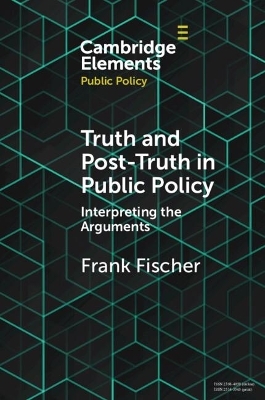
Truth and Post-Truth in Public Policy
Cambridge University Press (Verlag)
978-1-108-79607-1 (ISBN)
The phenomenon of post-truth poses a problem for the public policy-oriented sciences, including policy analysis. Along with “fake news,” the post-truth denial of facts constitutes a major concern for numerous policy fields. Whereas a standard response is to call for more and better factual information, this Element shows that the effort to understand this phenomenon has to go beyond the emphasis on facts to include an understanding of the social meanings that get attached to facts in the political world of public policy. The challenge is thus seen to be as much about a politics of meaning as it is about epistemology. The analysis here supplements the examination of facts with an interpretive policy-analytic approach to gain a fuller understanding of post-truth. The importance of the interpretive perspective is illustrated by examining the policy arguments that have shaped policy controversies related to climate change and coronavirus denial.
Preface; 1. Introduction: Policy science, facts and the post-truth challenge; 2. Post-truth defined; 3. Post-truth: Ignorance and “anything goes”; 4. The political rise of the post-truth culture; 5. Emotion and post-truth: living with falsehoods; 6. Social media and disinformation; 7. Beyond the critique: rescuing interpretive social science; 8. The interpretive policy-analytic approach: social meanings and alternative realities; 9. Social Meaning in Interpretive Policy Analysis; 10. Interpretive social science and the scientific community: The “hard” sciences; 11. Citizens confront the experts: Context and emotion in ordinary reason; 12. Political and policy knowledge as ordinary practical knowledge; 13. Climate policy and denialism: A political illustration; 14. Climate Policy and politics: the social translation of evidence into political knowledge; 15. Climate research: Uncertain knowledge and falsification; 16. COVID-19 denialism: Interpreting narrative arguments; 17. Narrative arguments and the policy-analytic challenge: Interpreting COVID-19 statistics in social context; 18. Rejecting COVID-19 lockdown: Interpreting political-economic and ideological arguments; 19. Deliberating with post-truth deniers: Concluding remarks; References.
| Erscheinungsdatum | 29.11.2021 |
|---|---|
| Reihe/Serie | Elements in Public Policy |
| Zusatzinfo | Worked examples or Exercises |
| Verlagsort | Cambridge |
| Sprache | englisch |
| Maße | 151 x 229 mm |
| Gewicht | 160 g |
| Themenwelt | Sozialwissenschaften ► Kommunikation / Medien ► Journalistik |
| Sozialwissenschaften ► Politik / Verwaltung | |
| Wirtschaft ► Volkswirtschaftslehre ► Wirtschaftspolitik | |
| ISBN-10 | 1-108-79607-9 / 1108796079 |
| ISBN-13 | 978-1-108-79607-1 / 9781108796071 |
| Zustand | Neuware |
| Haben Sie eine Frage zum Produkt? |
aus dem Bereich


